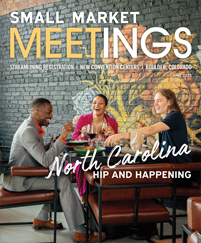Before signing the contract, check for an exclusivity clause.
Before signing the contract with a venue such as a hotel or a convention center, planners should negotiate the removal of any exclusivity clause that would require them to use the venue’s existing Wi-Fi network. An in-house service may fail to meet the planner’s needs, so it is ideal to retain the option of turning to the free market.
“It puts you at risk for being taken advantage of,” said Framson. “You may want to use the in-house vendor, but if you tie your hands up front, you give up full bargaining power.”
He gave an example of a recent client who was able to service its event for half the price of what the in-house vendor wanted to charge because the planner had made sure the contract was open-ended in regard to choosing a provider.
Evaluate what parts of the floor plan will require coverage.
Another important question to consider is which constituents, whether they are attendees, staff, media or vendors, will require access to the network during the event and where they will need to use it. Many planners overlook the complete square footage of the area that needs coverage.
“A meeting may be theater style, but you have to consider where the bathrooms will be in relation to that because that’s where everyone’s going to be sitting on their cell phones,” said Tyner.
However, depending on the nature of the event, this kind of coverage may not be necessary.
“You really have to assess the needs of the group to figure out what’s appropriate,” said Framson. “In some cases, you can leave it up to the attendees to handle it.”
Though Wi-Fi service may be optional at a community meeting or nonprofit banquet, a reliable connection is much more vital at a gaming event where 600 attendees will be downloading a mobile app and streaming live footage.
Prepare for potential setbacks.
One way to ensure that technology runs smoothly on the day of the event is to schedule a site survey so that the production staff knows for certain what kind of equipment to bring as well as where everything is located at the venue.
“A lot of clients don’t want to pay for it, but the smart ones do,” said Tyner.
Likewise, it is prudent to hire on-site tech support, instead of relying on hotel managers or other event staff to monitor the equipment.
“Everyone thinks they don’t need insurance until they do,” said Tyner. She described how a backup issue as simple as stepping on a cable can cause hours of confusion without dedicated tech personnel on hand.
For outdoor events, Framson recommended that planners remember to refuel their generators.
“I’ve had people call and say the internet is down at their outdoor event, and the first thing I ask is whether the generator went out,” said Framson. “Often the answer is yes.”












